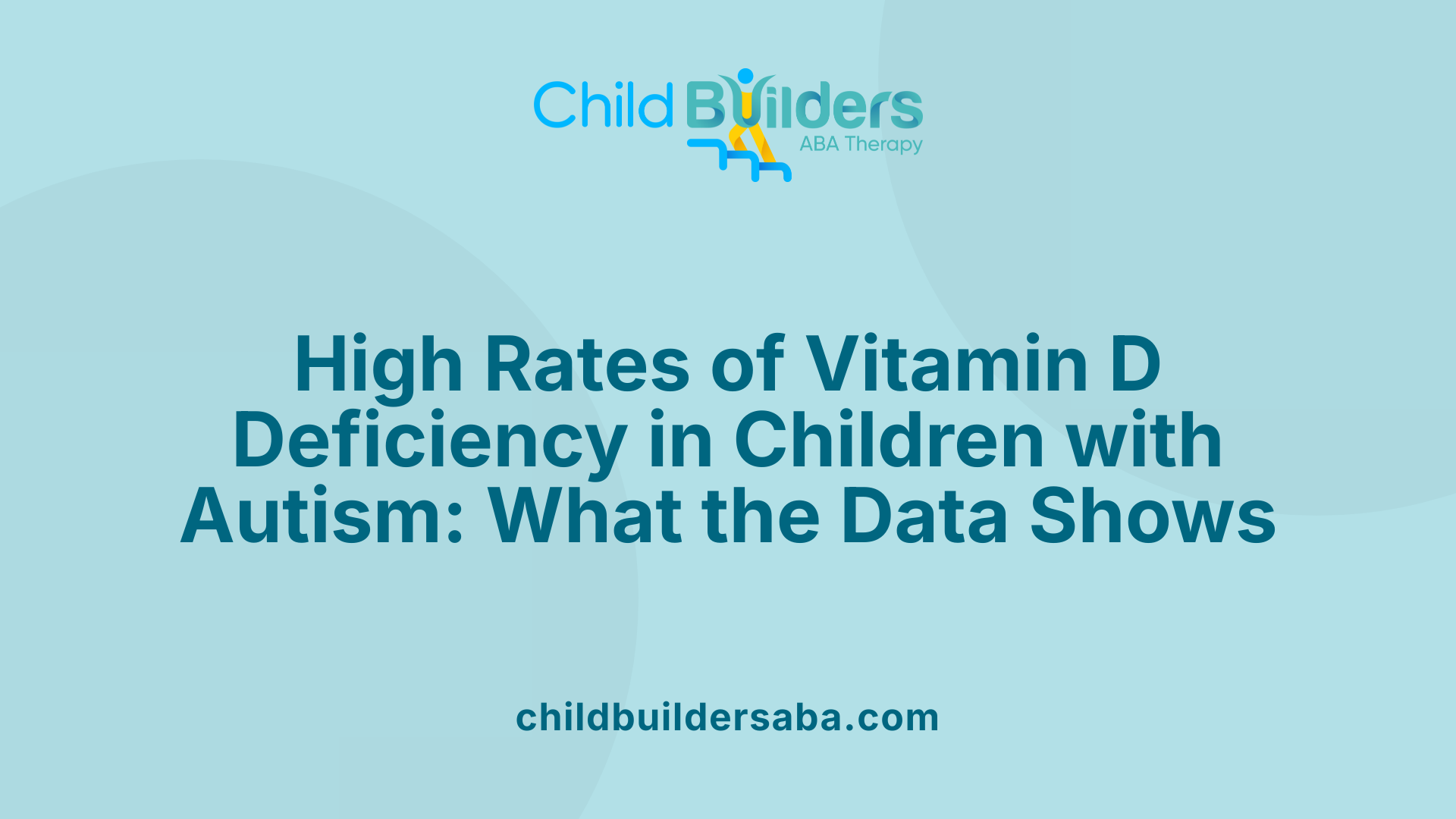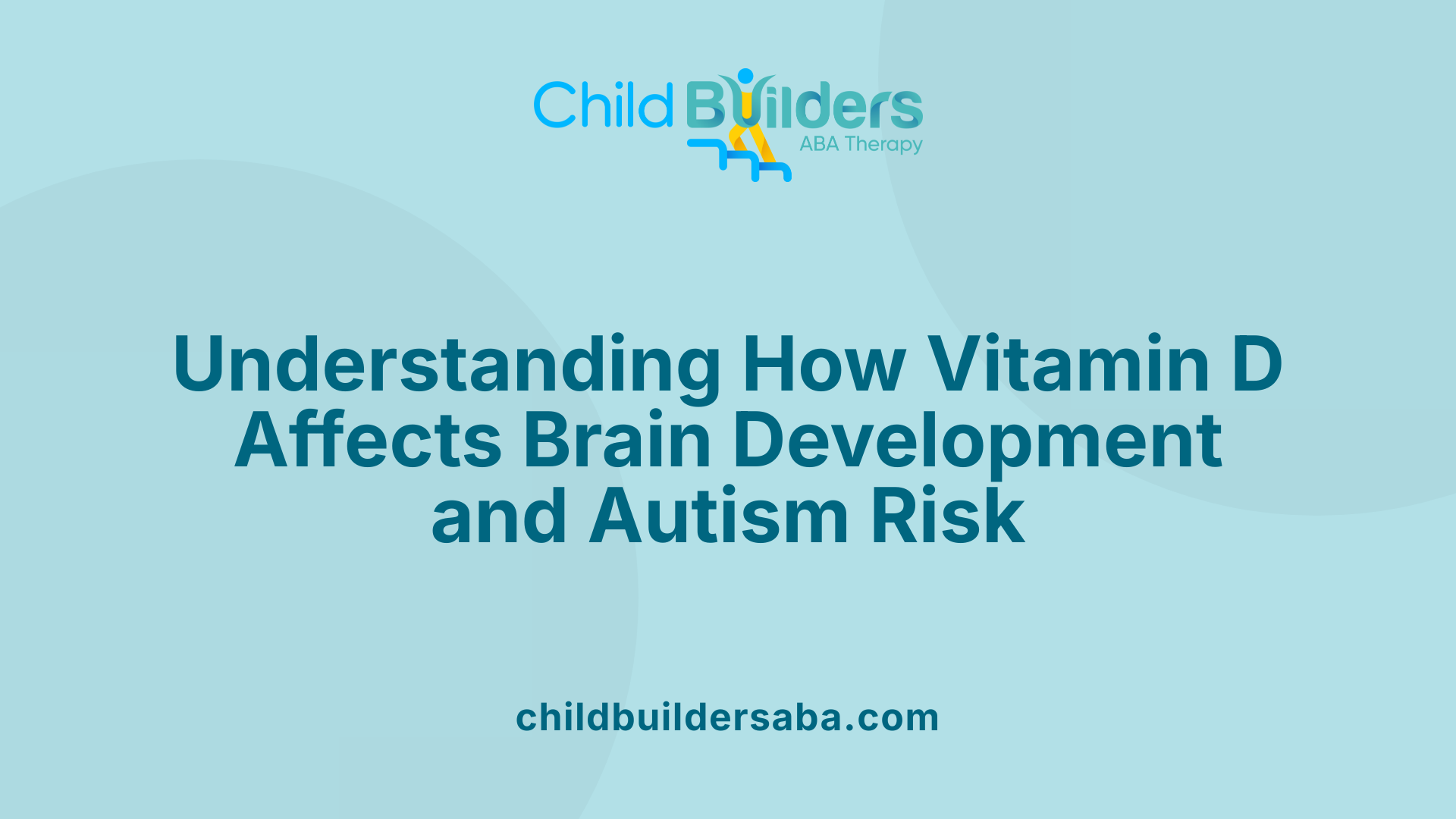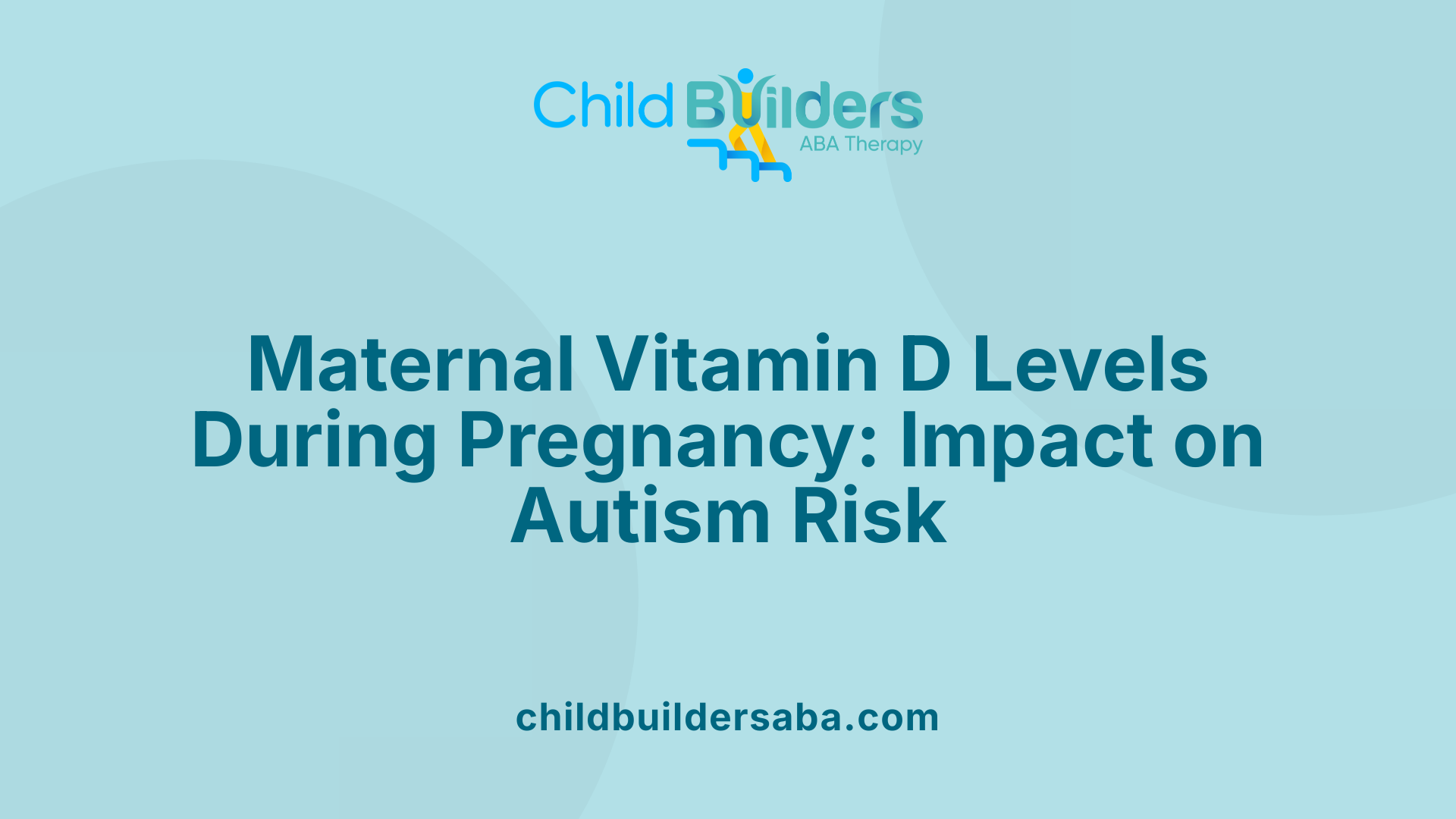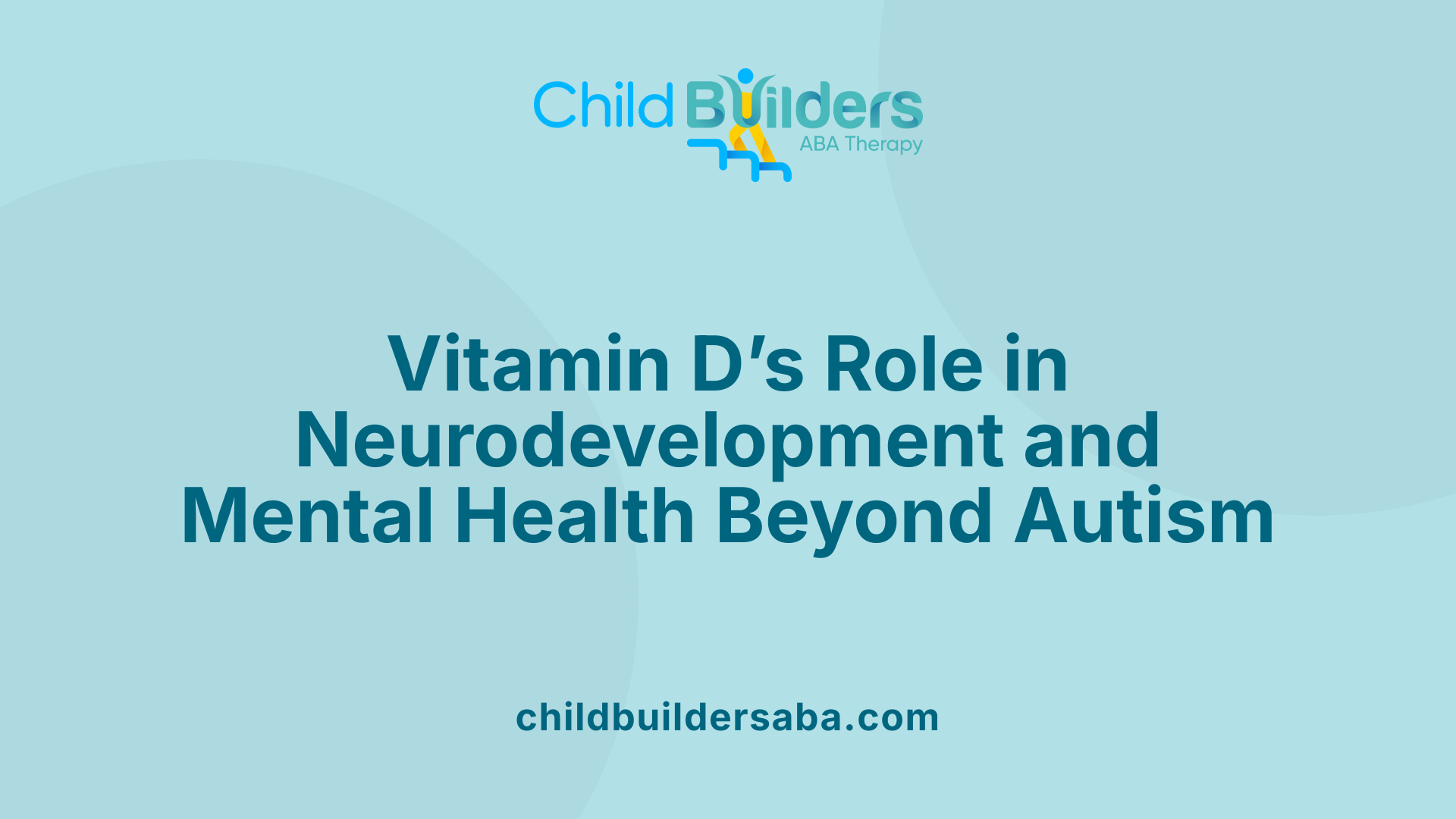Vitamin D and Autism

Understanding the Role of Vitamin D in Autism
Recent scientific research suggests that vitamin D, often called the 'sunshine vitamin,' may play a significant role in neurodevelopment and the risk of autism spectrum disorder (ASD). This article explores the complex relationship between vitamin D deficiency and ASD, examining biological mechanisms, prevalence rates, maternal influences, and potential benefits of supplementation.
Prevalence of Vitamin D Deficiency in Children with Autism
 Children with autism spectrum disorder (ASD) often face significant vitamin D deficiencies. The rates of deficiency among this group vary considerably across different studies, but some findings highlight a concerning trend. For example, a study from the Netherlands reported that approximately 75.9% of children with ASD had insufficient levels of vitamin D3, indicating a widespread deficiency.
Children with autism spectrum disorder (ASD) often face significant vitamin D deficiencies. The rates of deficiency among this group vary considerably across different studies, but some findings highlight a concerning trend. For example, a study from the Netherlands reported that approximately 75.9% of children with ASD had insufficient levels of vitamin D3, indicating a widespread deficiency.
Similarly, research from Turkey revealed that nearly 95% of individuals with ASD had low vitamin D levels, with about 13% experiencing severe deficiency. Neonatal studies also suggest that low vitamin D status is present early in life, with nearly half (48.7%) of infants diagnosed with ASD exhibiting deficient levels (<25 nmol/L). Such deficiencies at early stages correlate with an increased risk of developing ASD.
When comparing children with ASD to their neurotypical peers, the difference in vitamin D status becomes more evident. Most research indicates that children with ASD are more likely to suffer from deficiency or insufficiency, often with levels below 20 ng/mL. This high prevalence of deficiency supports the idea that vitamin D might play a role in ASD development and severity.
These findings have important implications. Elevated deficiency rates suggest that ensuring adequate vitamin D levels during pregnancy and early childhood could be a potential strategy to reduce the risk or severity of ASD. As vitamin D contributes critically to brain development and immune regulation, addressing these deficiencies could offer a way to improve health outcomes for children with autism.
Overall, the consistent observation of low vitamin D levels among children with ASD highlights the need for further research and potential intervention efforts to mitigate deficiency-related risks.
Biological Mechanisms Linking Vitamin D Deficiency to Autism

What are the biological mechanisms connecting vitamin D deficiency to autism?
Vitamin D plays a vital role in brain development and function. It acts as a neuroactive hormone, influencing various neurodevelopmental processes such as cell proliferation, differentiation, and apoptosis, all of which are crucial for forming a healthy brain.
One significant way vitamin D impacts ASD is through its involvement in neurotransmitter regulation. It helps modulate the production of serotonin, dopamine, and other neuropeptides like oxytocin, which are often found to be dysregulated in children with autism.
In addition, vitamin D’s anti-inflammatory properties are important for maintaining a healthy immune environment during fetal development. It reduces neuroinflammation by modulating immune responses, which may influence neurodevelopmental outcomes. Evidence suggests that maternal vitamin D deficiency during pregnancy can lead to increased inflammation, impacting fetal neurodevelopment negatively.
Animal studies support these mechanisms. For instance, prenatal vitamin D deficiency in animal models has resulted in neuroanatomical changes such as altered brain structure and behavior, resembling autism features. Supplementation during pregnancy prevented some of these ASD-like traits in offspring, indicating the importance of adequate vitamin D levels.
Furthermore, vitamin D influences gene expression involved in brain growth and neural connectivity. It also enhances synaptic plasticity, which is essential for learning and social behavior.
Overall, a deficiency in vitamin D may impair neurodevelopmental processes and immune regulation, increasing the risk of ASD. It’s clear that maintaining sufficient vitamin D levels during pregnancy and early childhood is critical for healthy brain development and may reduce the likelihood of autism spectrum disorder.
The Impact of Maternal and Early Life Vitamin D Levels

How does maternal vitamin D level during pregnancy affect the risk of autism in children?
Research suggests that vitamin D status during pregnancy can influence the neurodevelopmental outcomes of children. Specifically, low maternal vitamin D levels have been linked to an increased risk of autism spectrum disorder (ASD).
Large population-based studies from countries like Sweden have demonstrated that mothers with severe vitamin D deficiency—marked by serum 25-hydroxyvitamin D levels below 25 nmol/L—are more than twice as likely to have a child diagnosed with ASD accompanied by intellectual disabilities. These findings point toward a potential role of vitamin D in protecting against certain neurodevelopmental conditions.
Systematic reviews further support this link, showing that higher maternal vitamin D levels during pregnancy tend to correlate with lower risks of ASD and attention-deficit/hyperactivity disorder (ADHD) in their children. For example, each increase of 10 ng/mL in maternal vitamin D has been associated with about a 19% reduction in ASD risk.
However, the scientific community has not reached a consensus. Some longitudinal studies, including those in the UK, have not found strong evidence directly tying maternal vitamin D levels to autism risk. These discrepancies might stem from challenges in measuring vitamin D accurately, confounding variables, or differences in study design.
In summary, existing evidence points toward an association between maternal vitamin D deficiency during pregnancy and a higher likelihood of autism in offspring, but further research is necessary. Clarifying whether vitamin D deficiency causes increased ASD risk or simply correlates with it remains an important goal for future studies.
For those interested in exploring this topic further, searching for "Maternal vitamin D levels and autism risk" can provide additional insights and recent research updates.
Vitamin D in Broad Neurodevelopmental Context

What is the role of vitamin D in disorders such as ADHD and schizophrenia?
Research indicates that vitamin D is involved in the development of various neuropsychiatric conditions, including ADHD and schizophrenia. Studies show that many individuals with these disorders have lower vitamin D levels early in life. For example, newborns with vitamin D deficiency have an increased chance of developing mental disorders like ADHD and schizophrenia later into adulthood.
Vitamin D’s influence on brain development is multi-faceted. It helps regulate neurotransmitter synthesis, promote neurotrophic factors essential for neuronal growth, and supports cellular differentiation. These processes are particularly crucial during prenatal stages and early childhood.
Both observational data and genetic analyses reveal associations between low vitamin D levels during pregnancy or infancy and the subsequent risk of neurodevelopmental issues. For instance, higher maternal vitamin D levels correlate with reduced risks of autism, which shares underlying mechanisms with ADHD and schizophrenia.
Clinical findings also suggest that vitamin D deficiency may worsen symptoms in existing cases, implying that supplementation could serve as a supportive intervention. While evidence is still evolving, maintaining adequate vitamin D status during early development appears to be vital for optimal brain health and reducing the likelihood of neuropsychiatric conditions.
Potential Benefits and Safety of Vitamin D Supplementation
Can vitamin D supplementation help in the prevention or management of autism?
Research indicates that vitamin D may play a role in reducing some symptoms associated with autism spectrum disorder (ASD). Many children with ASD are found to have lower levels of vitamin D, and studies have shown a correlation between deficiency and increased severity of symptoms. Some clinical trials, including high-dose supplementation studies, report notable improvements in core autism behaviors such as social interaction, communication, and stereotypical behaviors.
Experimental research suggests that vitamin D’s influence on neurodevelopment, anti-inflammatory properties, and neurotransmitter regulation could explain these benefits. For example, vitamin D stimulates neurotrophins vital for brain growth and helps modulate immune responses that might contribute to ASD pathology.
While findings are promising, it’s important to note that results across different studies are mixed. Not all research reports significant improvements, and more well-designed, large-scale clinical trials are needed for conclusive evidence. Nonetheless, current data suggest that vitamin D supplementation, particularly when levels are initially low, could be a useful adjunct in managing some autism symptoms.
Supplementation protocols and dosages
Protocols for vitamin D supplementation in children with ASD vary widely. Some studies use fixed doses, such as 2000 IU per day, while others adjust doses based on body weight, for example, 300 IU per kg per day. Open-label trials have employed doses ranging from 300 IU/kg/day up to a maximum of 5000 IU/day.
Pregnant women and infants have also been supplemented with high doses, such as 5000 IU daily during pregnancy, which showed potential in reducing the risk of autism. In early childhood, doses around 1000 IU/day have been used safely.
Appropriate dosing should always be personalized, considering baseline vitamin D levels and age. Regular monitoring of serum 25(OH)D levels helps ensure safety and efficacy.
Safety profile and side effects
Vitamin D supplementation in children appears to be generally safe and well tolerated. Most studies report only mild, transient side effects, such as gastrointestinal discomfort or fatigue. No serious adverse effects have been consistently linked to recommended doses.
However, excessive intake of vitamin D can lead to toxicity, with symptoms like hypercalcemia. It’s essential to adhere to age-appropriate dosages and monitor serum calcium and vitamin D levels during high-dose therapy.
In summary, vitamin D supplements are safe for children with ASD when used responsibly. They could offer a supportive benefit in symptom management, especially for those with documented deficiencies.
| Aspect | Details | Additional Notes |
|---|---|---|
| Benefits | May reduce ASD severity, improve social and behavioral symptoms | Based on experimental and clinical trials |
| Dosages | Fixed (e.g., 2000 IU/day), weight-based (e.g., 300 IU/kg/day) | Doses vary; personalized approach recommended |
| Safety | Generally safe, minor side effects | Toxicity possible with excessive doses, monitoring advised |
Vitamin D as a Modifiable Risk Factor and Therapeutic Target
Although research continues to evolve, the accumulating evidence points toward a significant connection between vitamin D deficiency and autism spectrum disorder. Ensuring adequate vitamin D levels during pregnancy, infancy, and early childhood could represent a practical approach to reducing risk and mitigating symptoms. Given its safety profile and biological plausibility, vitamin D supplementation might be a simple, cost-effective strategy as part of a broader neurodevelopmental health protocol. Continued research and well-designed clinical trials are essential to establish definitive guidelines and harness the full potential of vitamin D in ASD prevention and management.
References
- The Role of Vitamin D Supplementation in Children with Autism ...
- Vitamin D and autism, what's new? - PubMed
- More findings point to high rate of vitamin D deficiency in children ...
- High-dose vitamin D3 supplementation in pregnancy and risk of ...
- Early vitamin D deficiency increases risk of ADHD, schizophrenia ...
- Associations between vitamin D and core symptoms in ASD | NDS
- Vitamin D the clue to more autism spectrum disorder in boys - News
- Developmental vitamin D deficiency and autism - PubMed
- Developmental vitamin D and autism spectrum disorders - Nature
- Research Progress on the Role of Vitamin D in Autism Spectrum ...

























.jpg)











































































